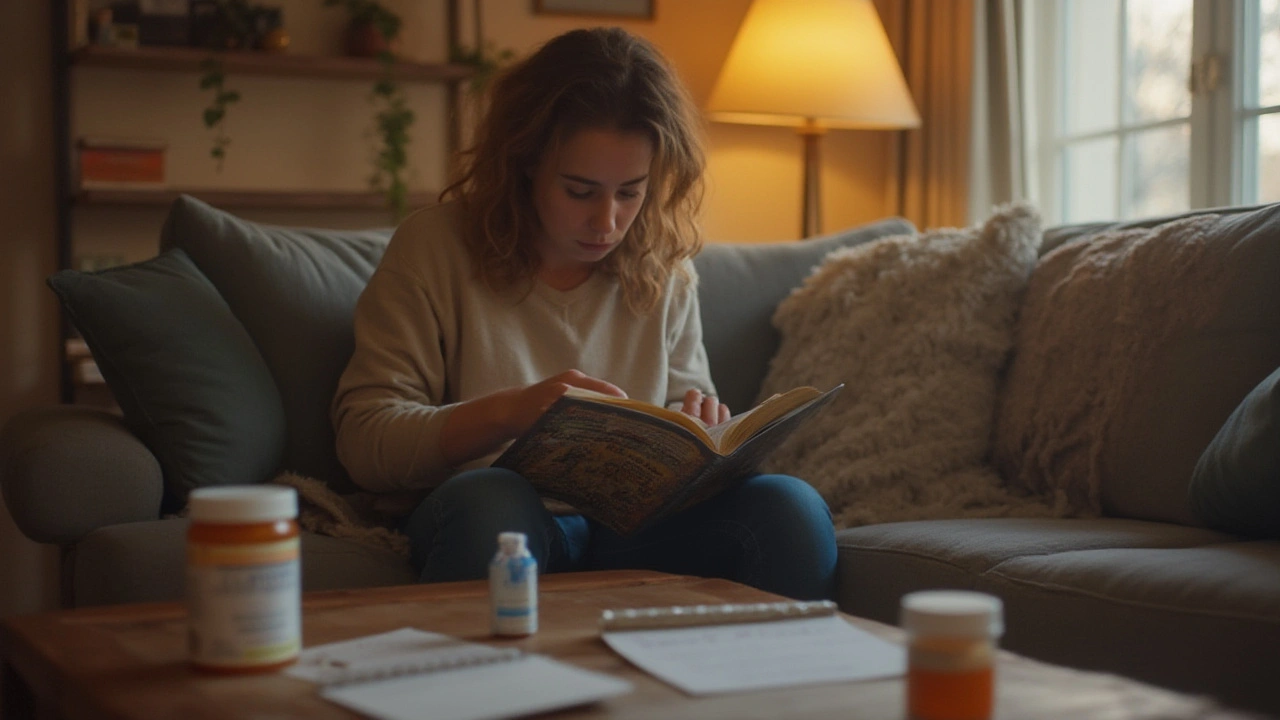You’d be surprised how many people reach for the familiar pink tablets when their nerves fire up. It’s late. Can’t sleep. Maybe your mind’s racing, your chest feels tight, and there’s a box of Benadryl in your medicine cabinet. Is it really as helpful as people think, or are you setting yourself up for trouble down the line? Lots of folks—students, parents, shift workers—swear Benadryl chills them out, but pharmacists have a much different take. Here’s what’s actually going on, behind the counter and under the hood.
What Is Benadryl, and Why Do People Use It for Anxiety?
Benadryl, or diphenhydramine, started its career as a trusty allergy medicine in 1946. It blocks histamine, the compound behind sneezing and itching. But it has another trick up its sleeve: it makes you sleepy. That sedative side effect is why it ended up as a go-to for nervous fliers, insomniacs, and yes, those feeling anxious and fidgety. Benadryl and anxiety get mentioned together so often, people assume there must be something official about it.
Here’s where it gets tricky: Benadryl wasn’t designed—or approved—for anxiety relief. The FDA only says it works for allergies and the common cold. Still, its drowsy punch gives the illusion it’s calming your nerves. This is a classic “off-label” use: a drug being used for something it wasn’t tested for. Unlike meds made for anxiety, like SSRIs or benzodiazepines, there are no clear dosing guidelines or proven long-term safety studies about Benadryl for this purpose.
There's also a key distinction between feeling drowsy and actually managing anxiety. Benadryl isn’t fixing any underlying chemical imbalances in the brain, nor tackling anxiety’s root cause. It just dulls you for a few hours. That might feel helpful for a panic attack that hits before a big meeting, but it’s not a real strategy. And—fun fact—a lot of people, especially older adults, react the wrong way. Instead of calming down, they get jittery or even agitated. My elderly neighbor once took Benadryl thinking it would help her sleep, and she ended up vacuuming her house at 2 a.m. Some people, especially kids, get hyperactive instead of calm.
Numbers tell the story. In a big 2023 pharmacy survey, 1 in 4 adults admitted using Benadryl at least once last year for sleep or nerves, not allergies. And ER docs still see people coming in with Benadryl overdoses, sometimes from chasing that 'calming' feeling a little too hard.
How Does Dosing Work? What Pharmacists Really Say
If you pop into a pharmacy and ask, “How much Benadryl for anxiety?”—you’ll probably get a raised eyebrow. Pharmacists have guidelines for allergies and sleep: usually 25-50 mg for adults, up to every 6 hours if needed. That’s it. Nothing official for stress or panic. Most pharmacists will warn you to be careful, especially if you’re older, pregnant, or have a history of heart issues, glaucoma, or urinary retention. The sleepy side effect comes from diphenhydramine’s antihistamine action in the brain, but it also has anticholinergic effects—basically slowing your body down, sometimes in ways you don’t want.
Here’s what’s important: it’s often a guessing game. Maybe one Benadryl helps you doze off and calm down, but the same dose can make someone else restless, confused, or even paranoid. And if you take it night after night? Your body adapts. The drowsiness fades, and you might need more pills to get the same result—a slippery slope.
Age also matters. Kids shouldn’t be given Benadryl for anxiety at all—there’s a big risk they could have the opposite reaction. In older adults, it can trigger confusion, memory problems, or even urinary retention. The American Geriatrics Society puts Benadryl on the “don’t use” list for seniors, period. For everyone else, the main worry is taking too much and stacking up side effects: dry mouth, blurred vision, constipation, or trouble peeing. Mix Benadryl with alcohol or other sedatives (even some anxiety meds), and you’re rolling the dice with your coordination and your breathing.
Pharmacists often wish they could print this warning out in every box: “This is not a fix for chronic anxiety.” There are real risks, especially with regular use. The drug doesn’t play well with several prescription meds—antidepressants, antipsychotics, and heart drugs—so don’t add it to your mix without asking a pro. For one-off, gotta-get-through-the-flight moments, yes, some folks use it. But for nightly nerves or daily worries, it’s not the best—or safest—option.
| Group | Recommended Benadryl Dose | Risks & Notes |
|---|---|---|
| Adults (18-65) | 25-50 mg every 4-6h (allergies/sleep) | May cause drowsiness, dry mouth. No anxiety dosage approved. |
| Older Adults (>65) | Not recommended | Risk of confusion, falls, memory issues. |
| Children (<12) | Not recommended for anxiety | Paradoxical agitation possible. Consult pediatrician for allergies. |

Tolerance, Dependence, and the Problem of Rebound Anxiety
Say you start using Benadryl to wind down a few nights a week. At first, it absolutely knocks you out. But give it a month, and suddenly it’s barely making a dent. Sound familiar? That’s tolerance, and Benadryl brings it on faster than most expect. The brain gets used to diphenhydramine’s sedative effects, and you find yourself taking a second pill, then a third. It creeps up, and before you know it, you’re stuck in a cycle.
This is where things get sketchy. If you stop suddenly after weeks or months of regular use, your sleep and anxiety can get even worse—something doctors call rebound anxiety or rebound insomnia. I’ve seen this firsthand: a friend who used Benadryl every night for sleep had wild, vivid nightmares and never-ending worry once she stopped cold turkey. Not fun. All those calming sensations the drug provided? They rebound and hit harder. That’s your brain, trying to reset its balance.
Symptoms of rebound anxiety can include:
- Irritability
- Difficulty concentrating
- Increased heart rate and muscle tension
- Insomnia and restless nights
Some people who lean heavily on Benadryl start feeling like they “can’t relax” without it. While diphenhydramine isn’t addictive in the classic sense (you don’t crave it for a buzz), dependence is a real risk. Your brain expects that hit, and missing it feels uncomfortable. It’s never a great sign when a medication meant to be occasional becomes a psychological crutch.
Now, if you’re someone who only uses Benadryl for anxiety during a flight, before a medical procedure, or once in a while? The odds of trouble are pretty low if you keep it occasional and stick to a safe dose. But all bets are off with daily or even weekly use.
There’s also the issue of “sleep hangover”—that groggy, foggy feeling that can last well into the next morning. This hangover can mess with your memory and your reaction time, especially if you’re behind the wheel or operating machinery at work. A 2022 study found that regular Benadryl use increased traffic accident risk in young adults by up to 30%. Not exactly what you want from a “relaxing” med.
Are There Better Alternatives? What Experts and Real People Prefer
So, if Benadryl is risky, what do pharmacists usually suggest instead for people looking to manage anxiety? For starters, it’s smart to find out if your anxiety is a one-off (test tomorrow, big date jitters) or part of your daily life. If it’s the latter, time to talk to your doc for real anxiety meds or therapy. Benadryl just puts a noisy, unreliable patch on a leaky boat.
Safer over-the-counter options for occasional nerves are slim, but a few gentle supplements get the green light for short-term use, like magnesium glycinate or L-theanine. Keep in mind, supplements are less regulated, so buy from brands you trust. You can also try herbal options—chamomile tea, passionflower, or valerian root are popular choices for those “uh oh, I can’t calm down” moments. Still, don’t expect miracles.
Lifestyle tweaks pay bigger dividends in the long run. Exercise—yeah, even neighborhood walks—changes brain chemistry more reliably than Benadryl ever could. Mindfulness meditation, journaling, and breathing exercises have stacks of research behind them for stress. Even stroking my cat Jasper for a few minutes when I’m frazzled has a measurable effect on my pulse and sense of calm. These tricks may not sound dramatic, but they work way better than a drowsy pill that messes with the brain for hours.
If anxiety regularly disrupts your life—wrecking your sleep, wrecking relationships—it’s definitely worth seeking a pro’s help. A family doc or mental health specialist can talk through safe prescription options if you need them: SSRIs, buspirone, or even short-term low-dose benzodiazepines (with caution). All are designed to help you long-term, rather than knock you out for a few hours with side effects and grogginess.
For more expert insight and a look at which OTC options really are safer—or riskier—than Benadryl, this guide on can Benadryl help with anxiety breaks down the science and recommends real-world alternatives that work.
Bottom line? Benadryl is everywhere, but that doesn’t make it a safe bet for anxiety. It’s like patching a leaky tire with chewing gum: sure, you’ll roll down the road for a bit, but sooner or later, you’ll have a bigger mess on your hands. If you’re tempted to grab it out of habit, remember, it was built for sneezing, not for taming a wild mind. There are smarter, safer ways to get calm, and your pharmacist (and probably your cat) will thank you for trying those first.







Leah Beazy
July 18, 2025 AT 20:44I used to take Benadryl every night just to chill out. Thought it was harmless. Turns out I was just training my brain to need it. One night I forgot and couldn’t sleep for 36 hours. My anxiety was worse than before. Don’t do it.
Robert Spiece
July 18, 2025 AT 22:35So let me get this straight-we’ve got a nation of people treating Benadryl like it’s the emotional equivalent of a weighted blanket, and pharmacists are just standing there holding a clipboard like it’s 1946 and we’re all still in high school? This isn’t anxiety management. This is self-medication via naptime. Next they’ll be prescribing NyQuil for existential dread.
Vivian Quinones
July 19, 2025 AT 18:54USA made the best medicine in the world and now people are using it like candy? We got SSRIs, therapy, yoga, CBD, and still folks reach for the pink stuff? This is why our healthcare system’s a mess. You want calm? Get a job. Pay taxes. Stop scrolling. Benadryl ain’t the problem-your life is.
Eric Pelletier
July 21, 2025 AT 14:38Just to clarify: diphenhydramine is a first-generation H1 antagonist with significant CNS penetration and anticholinergic activity. The sedation isn’t anxiolytic-it’s a side effect of non-selective muscarinic receptor blockade. Chronic use leads to downregulation of acetylcholine pathways, which explains tolerance and rebound hyperarousal. Also, the half-life is 4-10 hours, so morning grogginess isn’t ‘just sleep inertia’-it’s residual pharmacodynamic burden. You’re not calming your mind-you’re chemically fogging it.
Marshall Pope
July 22, 2025 AT 20:22man i used benadryl for like 3 years straight for anxiety and sleep… i didnt even realize i was addicted until i tried to stop and my heart was racing like i was running a marathon at 3am. now i just walk my dog. its better.
Nonie Rebollido
July 23, 2025 AT 03:38Same. I used to take it before flights. Now I just breathe and listen to lofi. Still works, no weird morning fog 😊
Agha Nugraha
July 23, 2025 AT 06:50In India, people use valerian root or ashwagandha for anxiety. No drowsiness. No rebound. Just calm. Benadryl seems like a lazy fix. I get it, it’s easy. But your body remembers.
Rekha Tiwari
July 23, 2025 AT 21:55My mom took Benadryl every night for 8 years. She forgot my birthday once because she was so foggy. Now she’s on magnesium and yoga. She’s like a new person 🙏✨ Don’t wait until it’s too late. Your brain deserves better than pink pills.
John Villamayor
July 25, 2025 AT 16:23Look I get it. Life is stressful. But if you’re popping Benadryl because you’re overwhelmed by your job your relationships your social media your rent your future then maybe the problem isn’t your nervous system. Maybe it’s your life. Just saying
Jenna Hobbs
July 26, 2025 AT 19:12Y’all. I went from 50mg every night to 100mg just to feel something. Then I started having hallucinations. Not fun. Not funny. I cried in my therapist’s office for an hour because I thought I was losing my mind. I’m 27. I shouldn’t need a sedative to exist. Please, please, please talk to someone. You’re not weak for needing help. You’re brave for asking.
Ophelia Q
July 28, 2025 AT 02:08I used to think Benadryl was my secret weapon until I realized I was just numbing myself. Therapy changed everything. Not overnight. But slowly. Like watering a plant. I still have bad days. But now I have tools. Not pills. 💛
Elliott Jackson
July 28, 2025 AT 08:11Okay but what if you’re just a person who likes to sleep? And Benadryl works? And you don’t have anxiety? What if you just like how it makes your body feel? Is that wrong? Are you a bad person if you use it responsibly? I mean, people drink wine to chill. Why is this different? 🤔
McKayla Carda
July 29, 2025 AT 17:25My therapist told me to try 100mg of magnesium before bed. I did. Slept like a baby. No grogginess. No rebound. Just peace. Try it.
Christopher Ramsbottom-Isherwood
July 30, 2025 AT 14:58Actually, there are studies showing diphenhydramine has mild anxiolytic properties in rodents. The problem is human trials are garbage. Also, most people who use it for anxiety are under 25 and don’t know what tolerance means. So yes, it’s risky. But it’s not the end of the world if you use it once in a blue moon. Chill out.
Stacy Reed
July 30, 2025 AT 17:46But what if your anxiety is because you’re trapped in a system that doesn’t care about you? What if the real problem isn’t your brain chemistry but your landlord your job your student debt your loneliness? Why are we treating symptoms instead of fixing the world? You can’t medicate capitalism away. But hey, at least you can sleep.